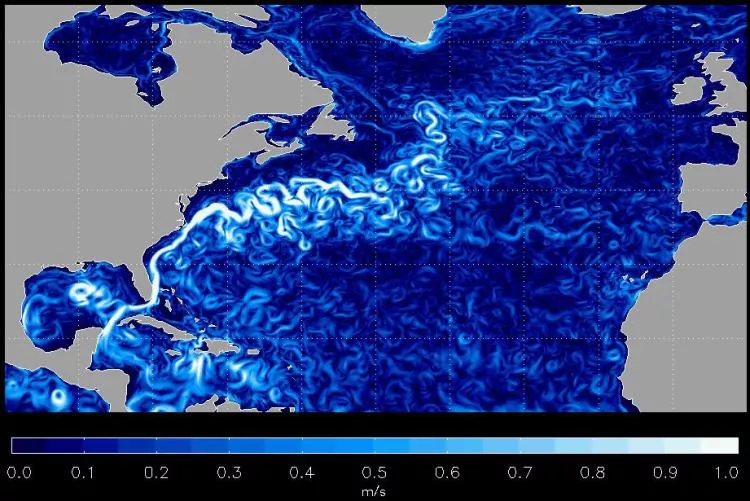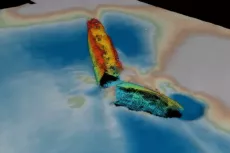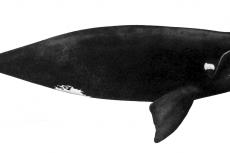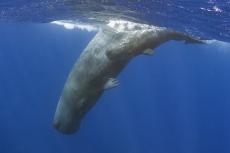Is the Gulf Stream about to collapse?
As climate change accelerates, the Gulf Stream shows signs of instability. Is a collapse imminent, or is the narrative more nuanced?
A study just published in Nature Communications suggests that the Atlantic Meridional Overturning Circulation (AMOC), of which the Gulf Stream is a part, could be approaching a tipping point. The AMOC, which has been gradually weakening over the last century and is reportedly at its weakest in over a millennium, could shift from its current strong mode to a weak one, with profound implications for the global climate.
The potential collapse of the Gulf Stream might have far-reaching impacts, which got a lot of commentators and the general public alarmed. It could disrupt rainfall patterns, affecting billions of people in India, South America and West Africa who rely on these rains for food. It could also increase storms and lower temperatures in Europe, raise sea levels off eastern North America, and further endanger the Amazon rainforest and Antarctic ice sheets.
The salient point
The Gulf Stream itself is, however, mainly driven by the rotation of the Earth so in order for it to collapse the Earth would have to stop spinning. What climate scientists are worried about is that the Atlantic Meridional Overturning Circulation stops.
We estimate a collapse of the AMOC to occur around mid-century under the current scenario of future emissions.
Ditlevsen et al
Dissent
However, not all scientists agree on the immediacy of such a collapse. As reported by Scientific American, some experts argue that the evidence for an imminent shutdown is insufficient. They say that the Gulf Stream is more resilient than currently portrayed and that its collapse is not imminent.
They point out that while the AMOC is weakening, it is unlikely to fully collapse within the next 100 years. The Intergovernmental Panel on Climate Change shares this view, stating that there is "medium confidence" the AMOC will not collapse before the end of this century.
Complicated matter
The debate is further complicated by the limitations of climate models, which may underestimate the AMOC's weakening. Some scientists argue that these models do not adequately simulate the influx of freshwater from melting ice, a major factor in the current's slowing.
Our knowledge about these complex systems is insufficient. We don't even know which changes to prepare for.
Sabine Hossenfelder
The complexity of the AMOC system and the uncertainty over future global heating levels make it challenging to predict the exact timing of a potential collapse. However, the severity of the potential impacts means that this is a risk we cannot afford to take. As one scientist puts it, "The signs of destabilization being visible already is something that I wouldn’t have expected and that I find scary."
Despite these differing viewpoints, the consensus is clear: the Gulf Stream is a critical component of our global climate system, and its potential collapse should not be taken lightly. As we continue to grapple with the issue, it is clear that every step we take towards reducing greenhouse gas emissions is a step away from the tipping point.
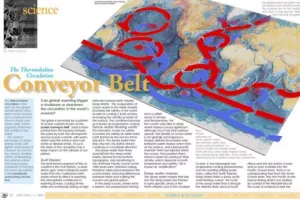
Background article in X-Ray Magazine
An article in X-Ray Magazine #11, titled Ocean conveyor belt - the thermohaline circulation, explains how the globe is encircled by a pattern of ocean currents known as the ocean conveyor belt.
Heat is transported from the equator towards the poles by both the atmosphere and by ocean currents, with warm water near the surface and cold water at deeper levels.
Link
Fact file
Atlantic Meridional Overturning Circulation (AMOC)
The Atlantic Meridional Overturning Circulation (AMOC) is a system of ocean currents that transports warm, salty water from the tropics to the North Atlantic. As the water cools and sinks in the north, it flows back towards the equator at depth, creating a "conveyor belt" of ocean circulation.
The AMOC plays a crucial role in regulating Earth's climate by distributing heat and influencing weather patterns. However, climate change is causing the AMOC to weaken, potentially disrupting this balance. Scientists are closely monitoring the AMOC as its collapse could have far-reaching impact on global climate.


